We asked AAN editors and reporters to share the stories they are the most proud of from the past year. What follows is an edited version of their responses.
Kimberly Jones, Austin Chronicle
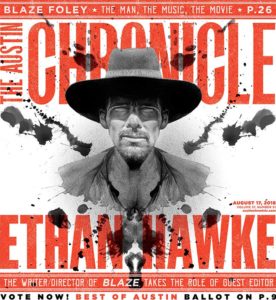 We had a lot of fun this summer producing a special issue guest edited by Ethan Hawke, timed to the release of his film Blaze (about legendary Austin musician/tragic genius Blaze Foley) and including a terrific interview Ethan did with Beto O’Rourke.
We had a lot of fun this summer producing a special issue guest edited by Ethan Hawke, timed to the release of his film Blaze (about legendary Austin musician/tragic genius Blaze Foley) and including a terrific interview Ethan did with Beto O’Rourke.
In less fun news, our reporter (& Qmmunity editor) Sarah Marloff spent 14 months working on this cover story investigation into allegations of sexual misconduct and other bad behavior at a beloved Austin coffeehouse/bar.
Jimmy Boegle, Coachella Valley Independent
“The Fear Factor” (published online Sept. 19 and in the October print edition) showed how the crackdown by Immigration and Customs Enforcement on undocumented immigrants–ramped up under the Trump administration–and the president’s hateful rhetoric have created fear not only in the Coachella Valley’s immigrant communities, but in the Latino community as a whole.“We hear from students what they are going through in their schools,” Luz Gallegos told us; she’s the community programs director for TODEC Legal Center, an organization which seeks to empower disenfranchised immigrant communities. “Even kids are emboldened to talk on their hate, saying things like, ‘Go back to Mexico!’ and calling them wetbacks. We see that people now feel empowered to speak out about feelings they’ve carried their entire lives.”
The story also covered another interesting element of the immigration mess in our country: A fear of speaking out. We contacted numerous medical organizations and businesses to discuss how the ICE crackdown had affected them and their clients/customers … but almost nobody would talk to us on the record, due to a fear of political backlash.
Eva Moore, Columbia Free Times
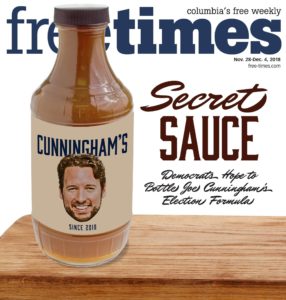 Nate Silver has called Democrat Joe Cunningham’s U.S. House victory in South Carolina one of the two most unlikely wins of the midterms. We explained how Cunningham did it in “Secret Sauce: Democrats Hope to Bottle Cunningham’s Election Formula.” And because this is South Carolina, that’s mustard-based sauce in that bottle.
Nate Silver has called Democrat Joe Cunningham’s U.S. House victory in South Carolina one of the two most unlikely wins of the midterms. We explained how Cunningham did it in “Secret Sauce: Democrats Hope to Bottle Cunningham’s Election Formula.” And because this is South Carolina, that’s mustard-based sauce in that bottle.
Elsewhere, we researched the underdocumented role of slaves in building Columbia and explained why so damn many cover bands play here.
Angela Evans, Boulder Weekly
Over the course of several months, Boulder Weekly investigated how a successful after school program mishandled complaints and allegations of child abuse coming from more than a dozen parents of children in the program. The parents were Latino, struggled with language issues and in some instances legal status, all of which had made it possible for their complaints to be kept from public view by the organization running the program. As a result of BW’s investigation, the local police department has reopened the case which it had never properly investigated years before and publicly admitted that closing the case had been a mistake. Also as a result of our story, the teacher in question has been permanently removed the classroom.
Sam Spence, Charleston City Paper
Some really great work from the Charleston City Paper team again this year across all sections. We dug through millions of dollars in tourism spending that our local visitor’s bureau is fighting to keep sealed; we spoofed Garden and Gun, a beautiful local high society glossy, and (separately) assembled the only written history of its namesake, an infamous 1970s nightclub; we chatted with Charleston’s remaining community newspapers; we asked local theater audiences to reconsider their role as patrons; we examined the disappearance of gay spaces in Charleston; we looked at the ongoing struggle in the legal community with drugs and alcohol; we attended a jazz concert inside a state prison; and we ordered a ton of tiki drinks (for work!)
Chris Faraone, DigBoston
Since the beginning of this year, DigBoston and our partners at the Boston Institute for Nonprofit Journalism have examined hundreds of state purchasing agreements, for everything from heavy crime-fighting equipment to consumables for laser printers.
Of the many contracts that caught our attention, the weapon purchasing free-for-all that goes on in our state has stood out as especially dubious, with entities on all sides operating in an unchecked fashion. Vendors are making millions of dollars off of Massachusetts with no accountability. For most of those procurements, there was no competitive bidding. And the process is far from transparent.
Now we’re teaming up with MuckRock and the Emerson College Engagement Lab to turn the heat up; the former even provided us with a dedicated portal on which anyone can search and annotate the thousands of pages of documents we have obtained through FOIA. We have had two public engagement events on the topic so far, and have dropped two pieces (Fire Sale Part 1 and Fire Sale Part 1 1/2) with at least four more on the horizon.
Anthony Mariani, Fort Worth Weekly
- This one about suicide was hard to write, but we’re glad we did it. It’s all part of our ongoing effort to weave literary-type pieces into our regular palette of hard news, investigations, critiques, and straight features.
- We pissed off Tyler Perry.
- The author of a book about this allegedly botched investigation that made national headlines has made our magazine the primary source of all information related to the case — as the dozens of comments indicate.
Kevin Allman, Gambit
 In New Orleans, reporter Alex Woodward spent a lot of time this year on two topics: ICE raids on the city’s Hispanic community and New Orleans’ new $40 million Real Time Crime Monitoring Center, which shares feeds with the city’s Department of Homeland Security, the Louisiana State Police, the FBI and unspecified “law enforcement partners.” This cover story examines both topics, and the fear that “crime monitoring” cameras may be used by ICE.
In New Orleans, reporter Alex Woodward spent a lot of time this year on two topics: ICE raids on the city’s Hispanic community and New Orleans’ new $40 million Real Time Crime Monitoring Center, which shares feeds with the city’s Department of Homeland Security, the Louisiana State Police, the FBI and unspecified “law enforcement partners.” This cover story examines both topics, and the fear that “crime monitoring” cameras may be used by ICE.
Jeffrey Billman, INDY Week
- We sent a reporter to El Salvador to report on a North Carolina teenager a year after he was deported.
- Later, we sent a writer to Honduras to report the story of a local expat who was seeking asylum on the grounds of domestic violence, which the Trump administration thinks should no longer be a thing.
- We investigated the case of Ronnie Long, a North Carolina man who has spent four decades behind bars for a rape he almost certainly didn’t commit.
- We investigated sexual abuse and a precedent-setting prosecution at an elite Montessori school in Raleigh.
- Our reporter spent six months digging into why the Durham foster care system was in crisis.
- We picked a fight with Jordan Peterson’s bro minions, which prompted the city council to denounce his appearance, which prompted more bro-minion outrage, etc.
- We wrote the definitive piece on Thomas Farr, a Jesse Helms acolyte Trump wanted to appoint to the federal bench. A few weeks ago, the Senate rejected him.
- We broke Young Dolphgate which in turn broke our website, when a Duke administrator (who’d previously lectured everyone on why they needed to be nicer to racists, because free speech), walked into a campus coffeeshop, heard a rap song he didn’t like, and demanded that the baristas be fired.
Chuck Strouse, Miami New Times
This Miami New Times story about Matthew Whitaker, the acting attorney general of the United States was cited in front page profiles in the New York Times, Washington Post and elsewhere. Wrote New York Times columnist Bret Stephens: “Kudos to Brittany Shammas of the Miami New Times for breaking the story that Whitaker served as a paid board member of World Patent Marketing, which was shut down in May by a federal court in Florida and ordered to pay a $25 million settlement following a complaint by the Federal Trade Commission that it was a business scam.”
Sara Rubin, Monterey County Weekly
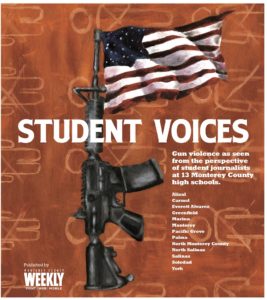
Six months later, sadly but unsurprisingly, gun violence was again dominating national news headlines. We ran a cover story with our CEO’s personal reflections on growing up in Pittsburgh and detailing his personal connections to Tree of Life synagogue, and also calling out locals in Monterey County who have engaged in hateful acts, including hate speech, some of it directed at our newspaper staff. With this issue, we published a manifesto online calling for common-sense gun reform and invited our readers to sign it. To date, 149 people have, including our U.S. Representative, Jimmy Panetta.
Something else I’m proud of this year is our ongoing coverage of press freedom. After Trump was elected, we created a new weekly section called “Free Speech,” and in conjunction with the Boston Globe-led project to coordinate editorials speaking out against Trump’s “enemy of the people” name-calling tactics, we compiled a list of all of our coverage of this topic (it’s at mcweekly.com/freepress). Just as that project launched in August, a city sued our newspaper, in a botched attempt to block publication of a story and order us to return records we had received. We proceeded to publish the story, defended our First Amendment rights in court—and prevailed.
Rob Burgess, NUVO
In case you didn’t notice, we had big election year. We even put together a Voters Guide with candidates from 30 different congressional, statewide, and county races answering questions submitted by our readers. We even extended that by answering our readers’ questions about the voting process itself. We’re very proud of the midterm elections coverage we did this year, and we look forward to informing voters during this coming 2019 municipal elections.
Lisa Cunningham, Pittsburgh City Paper
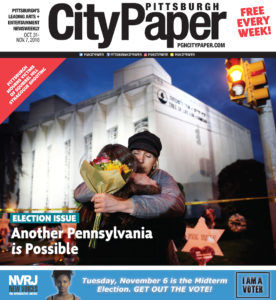 Several days before going to print on our Election Issue this October, tragedy struck our city: a mass shooting at Pittsburgh’s Tree of Life synagogue. Eleven people were killed and seven injured in an apparent hate crime. The cover we had planned — an optimistic, hopeful smiling photo of the first Black female state legislator from our region — suddenly no longer made sense while the city was in mourning. But through the sadness, what the city also proved in the coming days was its resilience, and our staff came together in a way I’ve never quite witnessed. Our associate publisher Justin Matase, whose home was close to the shooting, not only posted video online of the vigils and protests, but wrote a piece for our site. Our photographer Jared Wickerham was on the streets day and night covering the tragedy. He provided the beautiful last-minute cover photograph of women embracing in front of the memorial outside the synagogue, and also was interviewed about the events over Skype on the BBC. Our senior writer Ryan Deto, who guest edited the Election Issue, kept our social media feeds and blogs updated, and worked with me tirelessly on reworking the issue to fit the new mood. Through one of the worst weeks in recent history, it also became one of my proudest.
Several days before going to print on our Election Issue this October, tragedy struck our city: a mass shooting at Pittsburgh’s Tree of Life synagogue. Eleven people were killed and seven injured in an apparent hate crime. The cover we had planned — an optimistic, hopeful smiling photo of the first Black female state legislator from our region — suddenly no longer made sense while the city was in mourning. But through the sadness, what the city also proved in the coming days was its resilience, and our staff came together in a way I’ve never quite witnessed. Our associate publisher Justin Matase, whose home was close to the shooting, not only posted video online of the vigils and protests, but wrote a piece for our site. Our photographer Jared Wickerham was on the streets day and night covering the tragedy. He provided the beautiful last-minute cover photograph of women embracing in front of the memorial outside the synagogue, and also was interviewed about the events over Skype on the BBC. Our senior writer Ryan Deto, who guest edited the Election Issue, kept our social media feeds and blogs updated, and worked with me tirelessly on reworking the issue to fit the new mood. Through one of the worst weeks in recent history, it also became one of my proudest.
James Allen, Random Lengths News
The Project Censored Stories. Project Censored and AAN. In 1976, Dr. Carl Jensen founded Project Censored at Sonoma State University as a media research program with a focus on student development of media literacy and critical thinking skills as applied to the news media censorship in the U.S. Each year the Project researches, vets, and compiles the Top Twenty Five most censored and under-reported news stories in the US, and offers scholarly analysis and critiques, which are published by Seven Stories Press.
A report on these stories has appeared annually in many AAN papers over the years and was originally prepared by the SF Bay Guardian under the guidance of Bruce Brugman and then Tim Redmond. Three years ago the mantle was passed on to RLnews and our editors Paul Rosenberg and Terelle Jerricks have carried on the tradition. We now work in collaboration with Anson Stevens-Bollen, of the Santa Fe Reporter out of New Mexico for the graphics package.
This remains one of the most popular, if not informative, articles that are published by the indy media in North America.
Foon Rhee, Sacramento News & Review
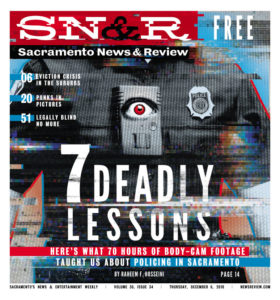 Before the police killing of Stephon Clark became a national story, it was an urgent local story in Sacramento. SN&R responded, remaking its cover and featuring Clark’s brother Stevante. Since that issue in March, SN&R has continued to follow the biggest local story of 2018, including a recent exclusive on all the body-cam video released by the Sacramento Police Department so far.
Before the police killing of Stephon Clark became a national story, it was an urgent local story in Sacramento. SN&R responded, remaking its cover and featuring Clark’s brother Stevante. Since that issue in March, SN&R has continued to follow the biggest local story of 2018, including a recent exclusive on all the body-cam video released by the Sacramento Police Department so far.
This story (“After the War”) checks all the boxes for an alternative weekly: It was an untold story about undiagnosed PTSD in Sacramento’s Hmong community. It gave voice to members of the community that too often go unheard. And it came from the grassroots: Hmong youths expressed to us how concerned they were about this public health issue. For the reporter, it generated the most positive feedback from the public and experts of any story in 2018—and for good reason.
Matthew Roy, Seven Days
 What I’m most proud of for 2018 is our “Give and Take” series on nonprofit organizations. We examined Vermont’s ecosystem, from tiny local charities to one of the biggest enterprises in the state: the $1.29 billion University of Vermont Medical Center. We built a database of their IRS Form 990s so that our news team could analyze revenues and expenses, and we identified the highest earning executives. We found questionable loans that nonprofits made to their officers. We reported about fundraising practices that enriched solicitors — but not the charities. We described loose state regulation and interviewed nonprofit board members who couldn’t answer basic questions, such as where their organization’s money goes. We also made a searchable database of nonprofits and their finances available online.
What I’m most proud of for 2018 is our “Give and Take” series on nonprofit organizations. We examined Vermont’s ecosystem, from tiny local charities to one of the biggest enterprises in the state: the $1.29 billion University of Vermont Medical Center. We built a database of their IRS Form 990s so that our news team could analyze revenues and expenses, and we identified the highest earning executives. We found questionable loans that nonprofits made to their officers. We reported about fundraising practices that enriched solicitors — but not the charities. We described loose state regulation and interviewed nonprofit board members who couldn’t answer basic questions, such as where their organization’s money goes. We also made a searchable database of nonprofits and their finances available online.
Another great team effort: Our recent “Our Towns” themed issue examined the problems facing Vermont’s treasured but imperiled small communities.
Brian Clarey, Triad City Beat
Here’s our biggest story of the year, via our website: A Trump Dating website. We recognized the couple in the ad because they were involved in the founding of the local tea party (at now-Congressman Mark Walker’s church). They attempted a coup of the Guilford County GOP, during which it came out that Barrett Riddleberger is a convicted sex offender — he taped himself having sex with a 15-year-old about 20 years ago. Still, an odd choice for a dating site, which looks to have been created by the couple’s son. This one got picked up by the Washington Post and a bunch of other outlets, but we got there first.
Laura Hayes, Washington City Paper
Diners in Washington, D.C. are enjoying a food and drink renaissance, but progress behind the scenes largely hasn’t caught up. This story, “Pressure Cooker,” provides a window in the stressors and hardships faced in restaurants from immigrant prep cooks to owner/operators as well as tales of how industry workers are learning to support each other absent of benefits like health insurance that could help them seek professional therapy.
Patricia Calhoun, Westword
Two 2018 stories by longtime Westword writer Alan Prendergast showed what alternative weeklies can do best: Highlight current injustices, while reminding (and, often, educating) readers of past injustices, too.
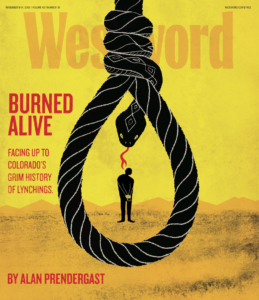 In “The Murder of Preston Porter Jr. and Colorado’s Grim History of Lynchings,” Prendergast detailed a horrific story of frontier justice in 1900 Colorado, when a sixteen-year-old black man was burned alive for the murder and rape of a twelve-year-old girl: a crime he’d confessed to after beatings, but almost certainly did not commit. “We can’t change what happened,” said Anthony Suggs, social-justice coordinator for the Episcopal Church in Colorado, who was part of a team that searched for the site of Porter’s death. “I don’t know if we can even change people’s minds. But we can create opportunities for people to take ownership of their history. People need to connect how the past affects the present.”
In “The Murder of Preston Porter Jr. and Colorado’s Grim History of Lynchings,” Prendergast detailed a horrific story of frontier justice in 1900 Colorado, when a sixteen-year-old black man was burned alive for the murder and rape of a twelve-year-old girl: a crime he’d confessed to after beatings, but almost certainly did not commit. “We can’t change what happened,” said Anthony Suggs, social-justice coordinator for the Episcopal Church in Colorado, who was part of a team that searched for the site of Porter’s death. “I don’t know if we can even change people’s minds. But we can create opportunities for people to take ownership of their history. People need to connect how the past affects the present.”
And how the present affects the present? In “At the Federal Supermax, When Does Isolation Become Torture?”, Prendergast described a far stickier, much more contemporary challenge. “There may or may not be a special place in hell for terrorists, but there is a special place in Colorado for them,” he writes, “a place for jihadists, conspirators, suppliers of material aid, failed suicide bombers, self-styled avengers, guerrilla leaders and more. Its name is H Unit.” It’s a prison within a prison, the only known black site on American soil, but it’s more like a black hole, a void where men are slowly buried alive in layers of isolation until they vanish entirely.
Aaron Mesh, Willamette Week
It’s rare for story to both upend a campaign for elected office and result in criminal charges. But most stories aren’t like the one told by Erica Naito-Campbell. When Charles McGee, then the founder and CEO of the Black Parent Initiative, officially entered the race for Multnomah County Commission in late 2017, he triggered his own demise—by causing Erica Naito-Campbell to come forward with a horrifying allegation.
Naito-Campbell had met McGee in 2010, when they both participated in a nine-month program for young leaders run by the Portland Business Alliance. She told WW that in May 2012, McGee and another man who’d also been in the program, banker Aubre Dickson, sexually assaulted her at McGee’s house. “I said ‘no’ over and over, so many times,” Naito-Campbell told WW.
WW reporter Nigel Jaquiss revealed her story in January. He spoke to six friends who knew Naito-Campbell, as well as her therapist. Their stories matched hers. He also obtained a written affidavit of her account, and was able to independently confirm key details, including phone records showing she called a rape crisis hotline in the wake of the alleged attack.
The story had enormous impact. McGee dropped out of the county race. His employer, the BPI, fired him. Dickson, who had been the chairman of the state’s affordable housing agency, resigned that position. He also lost his job at Key Bank. The Portland Police Bureau opened an investigation into Naito-Campbell’s allegations, which led to both men being indicted in May. They face trial on charges of sexual assault in March.
